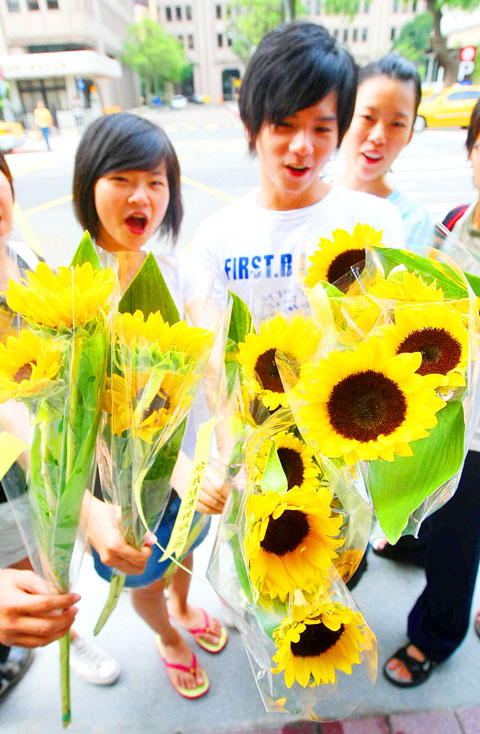Several Chinese Nationalist Party (KMT) legislators yesterday questioned the impartiality of a legislative watchdog after the organization gave them the worst reviews among all legislators from the organization.
KMT Legislator Tsai Chin-lung (蔡錦隆), who ranked bottom among members of the Home and Nations Committee in a review by Citizen Congress Watch (CCW), expressed doubts about the evaluation criteria.
“I was voted the worst [in the committee] only because I did not sign a CCW agreement [to push sunshine bills],” he said.

PHOTO: CNA
KMT Legislator Tsao Erh-chang (曹爾忠), who was considered by the CCW to have the worst performance among Transportation Committee members, accused the organization of disregarding his explanation on several occasions that his attendance record was seriously affected by the poor weather of Matsu.
KMT Legislator Chiu Yi (邱毅), who ranked lowest among members of the Judiciary and Organic Law and Statutes Committee, said the CCW was politically biased.
“This organization is pro-green. It is trying to protect [former president] Chen [Shui-bian (陳水扁)]. Of course it dislikes me,” Chiu said when asked for comment.
Chiu later filed a defamation lawsuit against CCW chairman Ku Chung-hwa (顧忠華) and board member Chen Ming-li (陳明理), saying that they “failed to rationally and reasonably supervise [the legislature],” but criticized “elected representatives who do not share their political views.”
The CCW publicized its evaluation of legislators on Sunday after some 100 evaluators, including academics, journalists, representatives from non-governmental organizations, businesspeople and students assessed lawmakers in accordance with their attendance record, how often they spoke at legislative meetings or whether they had signed an agreement to improve legislative transparency.
Seven KMT legislators, including Tsai, Tsao, Chiu, Hung Hsiu-chu (洪秀柱), Fu Kun-chi (傅崑萁), Chang Chia-chun (張嘉郡) and Hsu Shao-ping (徐少萍) and Non-Partisan Solidarity Union Legislator Lin Ping-kun (林炳坤) were considered to have been the worst performers.
None of the 27 Democratic Progressive Party legislators was ranked lower.
KMT caucus secretary-general Chang Sho-wen (張碩文) condemned the CCW, saying KMT lawmakers who received poor reviews had performed well in terms of their bills, budget reviews and service to voters in their electoral districts.
The CCW held a press conference yesterday afternoon in response to the criticism.
While apologizing to Chiu for failing to include his endorsement of the legislative transparency agreement when tallying Chiu’s score, which meant Chiu should have ranked ninth in the Judiciary and Organic Law and Statutes Committee, CCW secretary-general Ho Tsung-hsun (何宗勳) defended the standards adopted in making the evaluation.
Ho said review criteria came from many sources, such as official statistics on the legislature’s Web site, media reports and data provided by lawmakers.
A reviewer who wished to remain anonymous rebutted Chiu’s claim that the CCW was trying to protect the former president.
“We started collecting data for the review several months ago ... before Chen [Shui-bian] was suspected of money laundering,” he said.

Chinese Nationalist Party (KMT) Chairman Eric Chu (朱立倫), spokeswoman Yang Chih-yu (楊智伃) and Legislator Hsieh Lung-chieh (謝龍介) would be summoned by police for questioning for leading an illegal assembly on Thursday evening last week, Minister of the Interior Liu Shyh-fang (劉世芳) said today. The three KMT officials led an assembly outside the Taipei City Prosecutors’ Office, a restricted area where public assembly is not allowed, protesting the questioning of several KMT staff and searches of KMT headquarters and offices in a recall petition forgery case. Chu, Yang and Hsieh are all suspected of contravening the Assembly and Parade Act (集會遊行法) by holding

PRAISE: Japanese visitor Takashi Kubota said the Taiwanese temple architecture images showcased in the AI Art Gallery were the most impressive displays he saw Taiwan does not have an official pavilion at the World Expo in Osaka, Japan, because of its diplomatic predicament, but the government-backed Tech World pavilion is drawing interest with its unique recreations of works by Taiwanese artists. The pavilion features an artificial intelligence (AI)-based art gallery showcasing works of famous Taiwanese artists from the Japanese colonial period using innovative technologies. Among its main simulated displays are Eastern gouache paintings by Chen Chin (陳進), Lin Yu-shan (林玉山) and Kuo Hsueh-hu (郭雪湖), who were the three young Taiwanese painters selected for the East Asian Painting exhibition in 1927. Gouache is a water-based

Taiwan would welcome the return of Honduras as a diplomatic ally if its next president decides to make such a move, Minister of Foreign Affairs Lin Chia-lung (林佳龍) said yesterday. “Of course, we would welcome Honduras if they want to restore diplomatic ties with Taiwan after their elections,” Lin said at a meeting of the legislature’s Foreign Affairs and National Defense Committee, when asked to comment on statements made by two of the three Honduran presidential candidates during the presidential campaign in the Central American country. Taiwan is paying close attention to the region as a whole in the wake of a

OFF-TARGET: More than 30,000 participants were expected to take part in the Games next month, but only 6,550 foreign and 19,400 Taiwanese athletes have registered Taipei city councilors yesterday blasted the organizers of next month’s World Masters Games over sudden timetable and venue changes, which they said have caused thousands of participants to back out of the international sporting event, among other organizational issues. They also cited visa delays and political interference by China as reasons many foreign athletes are requesting refunds for the event, to be held from May 17 to 30. Jointly organized by the Taipei and New Taipei City governments, the games have been rocked by numerous controversies since preparations began in 2020. Taipei City Councilor Lin Yen-feng (林延鳳) said yesterday that new measures by